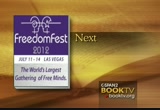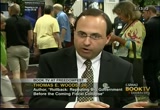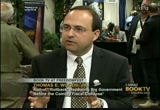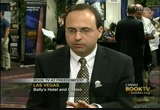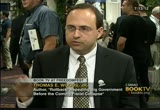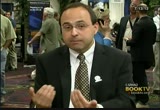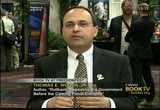tv Book TV CSPAN December 1, 2012 2:15pm-2:30pm EST
2:15 pm
2:16 pm
it's on now it's about twenty minutes. you're watching booktv on c-span2. we are on loo indication in las vegas at freedom fest. and we are joined now by author tom woods who is the author the recent book is "rollback." "rollback: repealing big government before the coming fiscal collapse" how would you describe the premises behind your book, and what are your main points that you are trying to get across? >> well, only about 5 percent of the book deals with fiscal issues and the budget. i would rather jump out a window than read or write a book. to set the stage we're on a trajectory left or right, democrat or republican, we have to admit can't be sustained. obviously some very wrenching changes are coming. the rest of the book is sort of gored toward kind of revisiting some of the arguments by which we were sold big government and wealthy. we have this program and -- what
2:17 pm
i'm trying to suggest when we have to cut back, it's not going to be the terrible catastrophe that the nightmare scenario to the contrary, the silver lining of the crisis it will cut back on some of the things and with give a lot more scope for entrepreneurship and freedom. >> what are one of those budget items that you could see being cut back that could bed a venn teenage use? >> well, like a book like this and a publisher like mine, it's assumed i'm a right-winger. i want to take the food stamps away from the poor people. i want h i'm a libertarian i want to abolish everything, but to me, you takes the low hacking fruit first. it's the pentagon. and, you know, there was a time when i was a conservative, and i thought if you want to cut the pentagon budget, you must be some kind of come -- comey that hates america. the pentagon in the department of defense and the only
2:18 pm
department not subject to audit, that doesn't mean they fail the awe cut or look at all the things they found. they're not subject to audit. what we've been finding figuring out is piece by piece is that for example, since 9/11 in the nine years after 9/11, the pentagon budget went up. the increase in the pentagon budget was $2 trillion. $1 trillion went to the war, the other trillion nobody knows where it went to because the air force has been scaled back, the navy has been scaled back, the army increased margely, but it it's budget was vastly increased. where did the money go? and i think this is a crisis that we're enduring that is going have to require both liberals and conservative to rethink re-examine some of the sacred cows and say we can't afford to say this is off the table for cuts. that's off the table for cuts. nothing is off the table but
2:19 pm
particularly the waste going on. but also it's not just that they have thrown a lot of money out the window. it's the way they do it. there are two techniques they use to sort of get the taxpayers spigot going. we have so we got political engineering where by once a program gets going, a missile program, a weapons program, it doesn't matter if the enemy that it was made for no longer exists. it doesn't matter that the thing can't really work as promised, the point what you try to do is get the project spread out as many congressional districts as you can particularly with congressman who have to sit on proposeses -- appropriations committee. the profit and the jobbings get spread around. you can't ever stop. it the other technique is to vastly overpromise what it can do and underpromise what the cost will be. so you can combine all the techniques and get an extremely unresponsive system. meanwhile you get conservatives
2:20 pm
who says i don't believe anything the government says and we have to cut things back. when it comes to the pentagon everything they say is holy scripture. this is a recipe for bankruptcy. >> what is the myth of good government? the title of one of your chapters? >> yeah, this is unfortunately this is going to strike right at the heart of the civic textbook platitude. that government is there to provide independenceble services we couldn't do without or provide forourself. government is composed by and large public minded servants that are looking out for the common good. i'm suggesting it's more or less a fairy tail. what more accurately describes is a period of thief comes -- people are looking to maintain the other power bases and increase the budget and authority. they begin now maybe they are thinking in a way that is public spirit. maybe they have so come to
2:21 pm
associate their department with the public good they can't think any other way. anything that increases the scope of my department is an improvement. they're all thinking at the end of the year we have to spend everlast dollar that was appropriated or next year they'll say you didn't need the money. you have to blow the money on whatever you can. the mentality is everywhere. it is sis stemmatic. >> without government science funding, everyone would be in . >> that's one of my lines. okay and i believe this for a long time. for a long time i was a free market guy i would say there are exceptions. let's not be extremists here. it's okay to have a free market in shoes, there are some things the market can't provide. i would thought obviously science is one of those. you can't necessarily earn a profit on basic science. it doesn't turn an immediate profit. you can't always capture the profit from science your competitor will grab the discovery and earn the profit.
2:22 pm
therefore will beless science undertaken. it's a typical neoclassical model. it's not going work in the free market. i believe it. it's it turns out it's not the case at all. secondly, the old model that we sort of abide by centuries ago the way science operates is gather data, you exam it, you draw some hypothesis and come up with experiments. and the experiment either confirms or does not confirm it. provisionally confirm or does not confirm the high pot cyst. that's the way science operates. again, that sounds possible but it turns out none of this describes how science works. you practice the way it's worked is not that the discovery are coming from people working in laboratory and discover things. the steam engine develops out of people looking at current technology. practical people and thinking i need to adapt this to my needs.
2:23 pm
they solve the problem on the spot. when the department of defense did a study and they said how much of the great breakthroughs came from science starting as scratch in the laboratory. they look at 700 fronts two came from the laboratory. science is applied science. and so it turns out that there has been far more funding of science a percentage of gdp by the private sector. research foundations, amateur science, in the age before we had income at and estate taxes. governments have been far less generations toward the sciences than the voluntary sector of society was. it's exactly the opposite of what we would think, so often we casually assume that things have to be the way they have always. and what i'm trying to do is do it what russell recommendation once awhile you have to hang a question mark on things you come
2:24 pm
to believe for a long time. >> thomas woods, what's the difference in your mind between the conservative and libertarian? >> well, this is a tricky one as i really -- my heart is on the table here. i feel like i have sympathy in both camps. i identify myself as a libertarian. libertarian has one basic principle which is nonaggression. you cannot initiate force against anybody else. i think a lot of people would agree with that. it's wrong to clock your neighborhood over the head. libertarians will take it to the logical. they involve initiation of violence against people who themselves who have not initiated. we would consider it to be legitimate. a conservative is less i guess id logical. conservative is deliberately or at least in the classical sense in edmund burke is not
2:25 pm
systematic. they have good reasons for being nonsystematic. life is too con flex. or to be reducible to left liberal most trum we have impose on the whole world. life is too variated and we have to be -- we have to use experience, we have -- and we have to use our knowledge of the past, and then move cautiously. they would view -- you see i speak with some sympathy. they would view the libertarian as a hopeless who wants to force the whole world to confirm to the one principle. my sympathy for the libertarian position is at least i can pin it down. sometimes trying to identify who is a real conservative, what's the screft position? it's like nailing jelly to a wall. >> you write that federal bankruptcy in short may turn out to be one of the best things that happened to america. >> yeah. i got in trouble for saying
2:26 pm
that. how dare this guy say that. when i say that federal bankruptcy may be a good thing. let's thoi the sense that any bankruptcy is a good thing. the owner of the a brument firm are not happy about the bankruptcy. the idea of bankruptcy you take a failing firm and you do it and sell off the asset and see what good may come from it. bankruptcy is sometimes the best thing to happen to a firm. in this case i'm saying it is the best thing happen to american society. we have interests that are so entrenched that nothing doesn't matter which candidate you vote for establishment candidate a. or b. you get the same programs by and large. you get marginal around the edges. you never get the programs out of there until the checks start balances. i was talking about the job growth, which is this relatively small budget program in the 1960s that persist to the idea
2:27 pm
and the idea to give people job training and go back to the market and find jobs. the fruits have been -- most people who go through the , i mean, about third of the people don't show up for the program. and then of the once who do, most never find work in their field or they wind up at barely over minimum wage job. the program costs about as much as it costs to put a guy through harvard. you would think it's a failure. if f it were private sector we would be laughing. if it's a government program we must be they haven't spent enough money. when say to the student, i have one student who asked if it fails why does it persist. i thought it was a beautiful naive question. congressman around the country will say it's a feather in the cap. i voted for the job corp. that helped to bring a lot of helpful programs here to the state. what nobody ever asks how many
2:28 pm
people went through the program got employed in the field. like in alabama where i live farred number of years. i have a friend an economist who did the job training program. how many trained somebody for a job that he got in the state that year the answer was one person. one person came through the program. obviously there have 0 got to be better ways of doing this. we're never going crack through -- there's so much entrench bureaucracy we might say that it's a shame $1 out of my tax dollars go to this. who is going waste a breath. you are getting a lot of concentrated benefits. will fight tooth and nail to keep the programs. that's why a clean slate seems to be what we need. >> we are at freedom fest in las vegas. this is booktv on c-span2. we are talking with author thomas woods about the most recent book "rollback: repealing
2:29 pm
big government before the coming fiscal collapse." where does the fed benefit in to "rollback"? >> good question. well, the fed is sort of another one of these topics that, again, we are taught not to really think about not to subjective to critical scrutiny, again, it's one of the thicks there for the common good. if you have a question about the federal reserve you're probably a crank. you might need some sort of psychology evaluation. because of the most financial crisis it's harder to make the arkment. people are sane are asking question about the federal reserve. what is this? does it do? what i'm suggesting is the fed is not the institution that when we respondent usely have the business sickle that have no explanation, the fed comes to the rescue and so.s the problem. the fed typical intense fies the program what we need to do is roll back the fed as well. the conventional wisdom surrounding the fed is dead
124 Views
IN COLLECTIONS
CSPAN2 Television Archive
Television Archive  Television Archive News Search Service
Television Archive News Search Service 
Uploaded by TV Archive on

 Live Music Archive
Live Music Archive Librivox Free Audio
Librivox Free Audio Metropolitan Museum
Metropolitan Museum Cleveland Museum of Art
Cleveland Museum of Art Internet Arcade
Internet Arcade Console Living Room
Console Living Room Books to Borrow
Books to Borrow Open Library
Open Library TV News
TV News Understanding 9/11
Understanding 9/11
